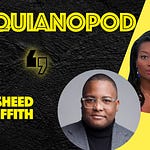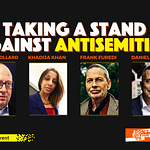In May 2021, during a pro-Israel demonstration in London, Harry Saul Markham was part of a small group of Jewish protesters who found themselves surrounded by a much larger, hostile crowd of largely Muslims. The group was targeted with antisemitic abuse, threats, and physical intimidation — including rocks being hurled in their direction. Many of those in the crowd were ordinary men, some with their children, chanting slogans that were openly violent and deeply hateful.
This was not a scene from a failed state. This happened outside Downing Street, in the heart of one of the most “diverse” cities in the world.
That moment shaped the book Harry would go on to write: The Melted Pot: Diversity, Antisemitism and the Limits of Tolerance. It also formed the starting point for our latest conversation on The Equiano Project podcast.
Harry challenges is the idea that multiculturalism — as a political and ideological project — has succeeded. He argues that it hasn’t. And that, in fact, it has created fertile ground for the erosion of core liberal values.
One of the most pressing themes in our conversation is what he calls “Islamism beyond Islamists.” In other words, extremist attitudes — towards Jews, towards women, towards free speech — that aren’t limited to a few radical individuals, but are increasingly normalised within sections of the Muslim community. In the same year as the Downing Street incident, another group of young men drove through Jewish areas of London shouting about raping Jewish daughters. They were not formally connected to any extremist group. The case against them was dismissed.
How did we get here? How did we become a society where such incidents don’t provoke serious national reflection, let alone accountability?
Multiculturalism, as it’s currently practiced, avoids this question. It insists that all cultures must be respected equally, and that critique is a form of bigotry. The result is that difficult but essential conversations are shut down. And in their place, the conditions for deeper fragmentation take root.
You can watch the full discussion on YouTube, and we highly recommend reading The Melted Pot if you want a deeper examination of the questions we raise.










